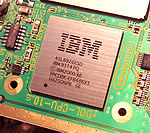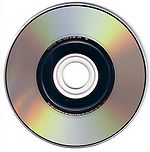GameCube technical specifications
Appearance
Nintendo originally offered a digital video output on early GameCube models. However, it was determined that less than one percent of users utilized the feature. The company eventually removed the option starting with model number DOL-101 of May 2004.[1] The console's technical specifications are as follows.[2][3][4]






| Details | Source(s) | |
|---|---|---|
| CPU |
|
[5][6] |
| GPU |
|
[5][6][10] |
| System Memory |
|
[6][11][10] |
| Audio |
|
[5][11] |
| Video Modes |
|
[5] |
| Connectivity |
|
[5][better source needed] |
| Storage |
|
[5][11][13] |
| Other |
|
[11] |
References
[edit]- ^ "Nintendo's GameCube Component FAQ page". Nintendo. Retrieved March 27, 2008.
- ^ a b c "DCTP - Nintendo's Gamecube Technical Overview". Archived from the original on December 31, 2015. Retrieved November 22, 2015.
- ^ "Console Specs". Retrieved November 22, 2015.
- ^ IGN Staff (November 4, 2000). "Gamecube Versus PlayStation 2". IGN. Retrieved November 22, 2015.
- ^ a b c d e f g h Shimpi, Anand Lal (December 7, 2001). "Hardware Behind the Consoles - Part II: Nintendo's GameCube". AnandTech. Retrieved July 9, 2013.
- ^ a b c "Game Consoles: A Look Ahead". Ace's Hardware. December 14, 2003. Archived from the original on February 8, 2004. Retrieved March 27, 2008.
- ^ a b c d Graphics Processor Specifications, IGN, 2001
- ^ IGN Staff (January 17, 2001). "GameCube 101: Graphics". IGN. Retrieved November 22, 2015.
- ^ "X-ing Things Out". IGN. January 9, 2001. Archived from the original on January 23, 2001. Retrieved November 12, 2021.
- ^ a b GameCube clears path for game developers, EE Times, 5/16/2001
- ^ a b c d "GCN Technical Specifications". Nintendo. Archived from the original on May 2, 2008. Retrieved March 28, 2008.
- ^ "| Nintendo - Customer Service - Memory Card 1019 |".
- ^ "Nintendo GameCube Accessories". Nintendo. Archived from the original on September 11, 2012. Retrieved July 3, 2009. (dead)
